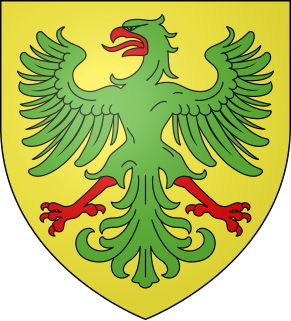
John le Taverner (fl. 1295–1313) was an English politician. He was the member of parliament for Bristol in Edward I's Model Parliament in 1295 and again in 1298 and 1306. [1] He was mayor of Bristol in 1308, 1309 and 1313. [2]

John le Taverner (fl. 1295–1313) was an English politician. He was the member of parliament for Bristol in Edward I's Model Parliament in 1295 and again in 1298 and 1306. [1] He was mayor of Bristol in 1308, 1309 and 1313. [2]

Gilbert de Clare, 6th Earl of Hertford, 7th Earl of Gloucester was a powerful English noble. He was also known as "Red" Gilbert de Clare or "The Red Earl", probably because of his hair colour or fiery temper in battle. He held the Lordship of Glamorgan which was one of the most powerful and wealthy of the Welsh Marcher Lordships as well as over 200 English manors.

The region now known as Gloucestershire was originally inhabited by Brythonic peoples in the Iron Age and Roman periods. After the Romans left Britain in the early 5th century, the Brythons re-established control but the territorial divisions for the post-Roman period are uncertain. The city of Caerloyw was one centre and Cirencester may have continued as a tribal centre as well. The only reliably attested kingdom is the minor south-east Wales kingdom of Ergyng, which may have included a portion of the area. In the final quarter of the 6th century, the Saxons of Wessex began to establish control over the area.

Gloucester is a constituency centred on the cathedral city and county town of the same name, represented in the House of Commons of the UK Parliament by Richard Graham of the Conservative Party.

Temple Church, also known as Holy Cross Church, is a ruined church in Redcliffe, Bristol, England. It is on the site of a previous, round church of the Knights Templar, which they built on land granted to them in the second quarter of the 12th century by Robert of Gloucester. In 1313 the Knights Hospitaller acquired the church, following the suppression of the Templars, only to lose it in 1540 at the time of the Dissolution of the Monasteries. By the early 14th century, the church served as the parish church for the area known as Temple Fee. From around the same time, the rebuilding of the church on a rectangular plan started. This was completed by 1460, with the construction of a leaning west tower.
The constituency of Gloucestershire was a UK Parliamentary constituency. After it was abolished under the 1832 Electoral Reform Act, two new constituencies, West Gloucestershire and East Gloucestershire, were created.

Ralph de Monthermer, 1st Baron Monthermer, Earl of Gloucester, Hertford, and Atholl was an English nobleman, who was the son-in-law of King Edward I. His clandestine marriage to the King's widowed daughter Joan greatly offended her father, but he was quickly persuaded to pardon Ralph.

Colonel Sir Edward Stock Hill was a Conservative Party politician in the United Kingdom who served as Member of Parliament (MP) for Bristol South from 1886 to 1900.
Sir Philip Despenser, Knt., of Goxhill, Lincolnshire was the son of Hugh Despenser, 1st Earl of Winchester and his wife, Isabella de Beauchamp, daughter of William de Beauchamp, 9th Earl of Warwick and Maud FitzJohn. He was born ca. 1290 in Stoke, Gloucester, England, and died on 24 September 1313. He married Margaret de Goushill, daughter of Ralph De Gousille and his wife Hawise Fitzwarine. Philip was brother to Hugh Despenser the Younger, a favorite of King Edward II.
Richard de Abyndon, Abendon, or Abingdon was an English judge.
Humphrey Hooke was an English politician who sat in the House of Commons from 1640 to 1642. He supported the Royalist cause in the English Civil War.
John Stoke or Stokes was an English politician.
John Butte, was an English politician.

John Botetourt, 1st Baron Botetourt was an English military commander and admiral in the 13th and 14th centuries.

William Killigrew Wait was a Bristol merchant and the Conservative Party member of Parliament for Gloucester elected in the 1873 Gloucester by-election. His opponent was Thomas Robinson of the Liberal Party who was subsequently elected in 1880. The 1873 by-election was marred by accusations of corruption but an enquiry by the Electoral Commission upheld Wait's victory.
John William Miles was a British Conservative politician and short-lived MP.
John Lucy was an English Member of Parliament.
Sir William Tracy was an English Member of Parliament.
Nicholas de Sancto Mauro or Nicholas Seymour was a member of the Seymour family and a Member of Parliament for Gloucestershire in March 1313.
Galfridus de Wolvehope was an English Member of Parliament.
Roger Turtle was an English politician. He was the member of parliament for Bristol in 1344. He was mayor of Bristol in 1326, 1330, 1332, 1333, 1335, 1340 and 1341.